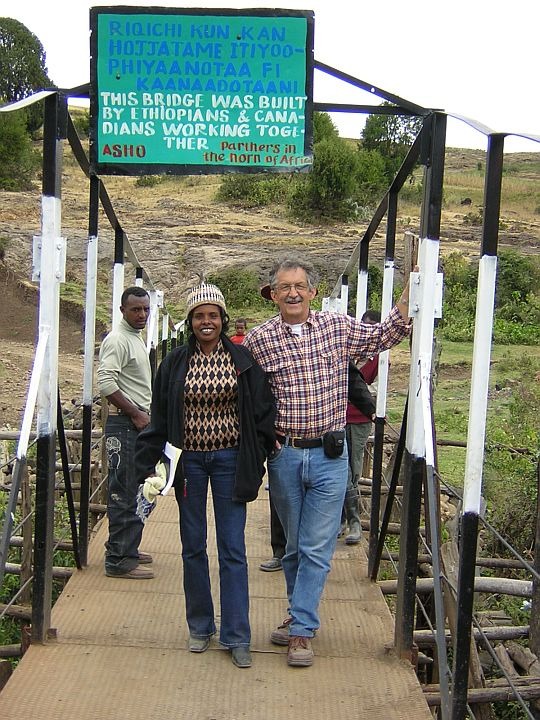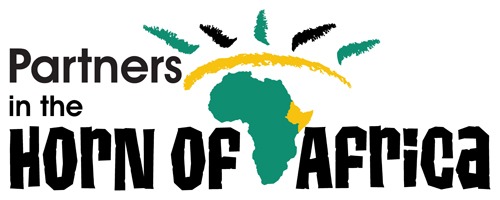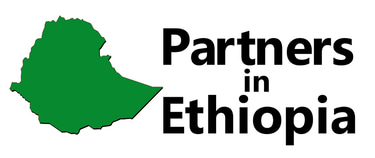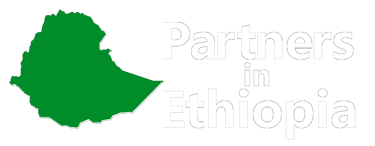
Partners in Ethiopia is inspired by
Partners in the Horn of Africa


Woinshet and John on the inaugural PiHA project, the first of three footbridges in Agarfa.


Partners in Ethiopia – A Reimagining of the Partners in the Horn of Africa model
In 2016 before he passed away, John Baigent was awarded the Meritorious Service Medal by the Governor General of Canada because of his passion for realizing effective aid in Ethiopia and his ability to inspire volunteers and donors and manage projects.
“As founding executive director of Partners in the Horn of Africa (PiHA), John Baigent created a new model for working with developing communities in Ethiopia. Local groups are partners in each project, actively involved in prioritizing their needs and supplying at least 15 per cent of the resources in either cash or labour. The result is new schools, wells, libraries and bridges—and communities with the skills and commitment to maintain them.”
For many of us, perhaps including your self, Partners in the Horn of Africa was an easy choice to entrust our donations with the confidence our money was being used effectively. Co-founded by John Baigent and Mekonen Bayssie and supported by a wide circle of donors and enthusiastic volunteers, it had a compelling story of efficient aid projects in Ethiopia from grassroots efforts in 1999-2000 to official incorporation in 2001, through to 2018 with community-directed small scale projects of all types, with 100% of donations going directly to projects and each project with a community funded contribution of 15-20% the project cost. In the end about $12 million in community-enabling aid projects impacted literally hundreds of thousands of live in various regions of Ethiopia.
Projects varied from infrastructure projects like footbridges, schools, libraries, wells and water containment and reforestation to social support projects such as group homes for orphans and disadvantaged girls, menstrual product support and micro-finance projects for women. One of the advantages in Ethiopia is that once a facility like a school is built, the government will fund it’s operations, which allowed PiHA to move on to the next build knowing the operations would be funded by the country.
With John’s passing in 2016, the PiHA Board in 2017 made the difficult decision to start winding down operations down. John’s widow Woinshet Bayssie and now her brother Mekonen have been inspired to resurrect the spirit of the PiHA model in a new organization, Partners in Ethiopia (PIE) that will initially focus on projects in the Agarfa woreda (aka district) and honour the legacy of John’s inspiration.
Mekonen and Woinshet (and their family) connected with John in the formative years of PiHA and inspired early aid efforts to their Agarfa hometown with the connections they offered. Mekonen met John in a fortuitous meeting in a Sudanese refugee camp as a political dissident and they concurred on a new model of how aid could be delivered more effectively than in the past. Mekonen would go on to continue to serve on the PiHA Board of Directors for it’s duration while he attended universities in Canada and the U.S. and would ultimately become a Materials Scientist with the U.S. Nuclear Regulatory Commission in Baltimore. Woinshet was one of the earliest community volunteers facilitating projects in Agarfa with her expertise as a community nurse and served on the Agarfa Self Help Organization (ASHO) Committee and also as an unofficial translator between Amharic, Oromo and English. Agarfa would be beneficiary of many of the earliest PHA projects including 3 footbridges, many water containment projects, a school and several additions of libraries to existing schools, as well as micro-finance programs. Woinshet’s enthusiasm for the cause and her engaging personality would ultimately inspire John and her to marry in 2008 and Woinshet would continue to serve as the unofficial ambassador and community connector for PiHA from Canada.
Woinshet has tracked down a reputable volunteer run Canadian NGO named Rose Charities Canada (RCC) that provides a legal and financial framework for PIE and 18 other community to community projects around the world, all for the cost of 4% of donations and saves us the annual costs of income tax receipting, bookkeeping, audits and financial reporting. For the past two years, we have been proving the concept and the administrative model by delivering small scale funding of school text books, school uniforms and menstrual product support for those in need, along with COVID-19 related safety products. We can now say with confidence that 96% of our donations go directly to fund aid in Ethiopia – John would be proud to hear that.
This has been realized so efficiently thanks to Vision For Bright Future (VBF), our volunteer-run on the ground NGO partner in Ethiopia headed by volunteer Executive Director Mulualem Mekonnen who leads a group of volunteers in the Agarfa community. We have also reconnected with Fekadu Kebede who is a Project Manager who effectively led many of the PiHA infrastructure projects in this area over the years.
Woinshet has also inspired a group of long-term PiHA supporters to join her and her brother on the PIE Committee (a defacto Board of Directors) which now includes a health administrator, a teacher, a mechanical engineer and a software engineer. She is also busy building a network of fundraising volunteers and connections to local service clubs and foundations who fund international development including several Rotary Clubs. She herself is a Rotarian in the Rotary Club of Salmon Arm Shuswap, as was John before her.
We feel that Partners in Ethiopia is ready to tackle our first major infrastructure projects, a Maternal Care Centre (MCC) that will be adjunct to the Agarfa Hospital.




